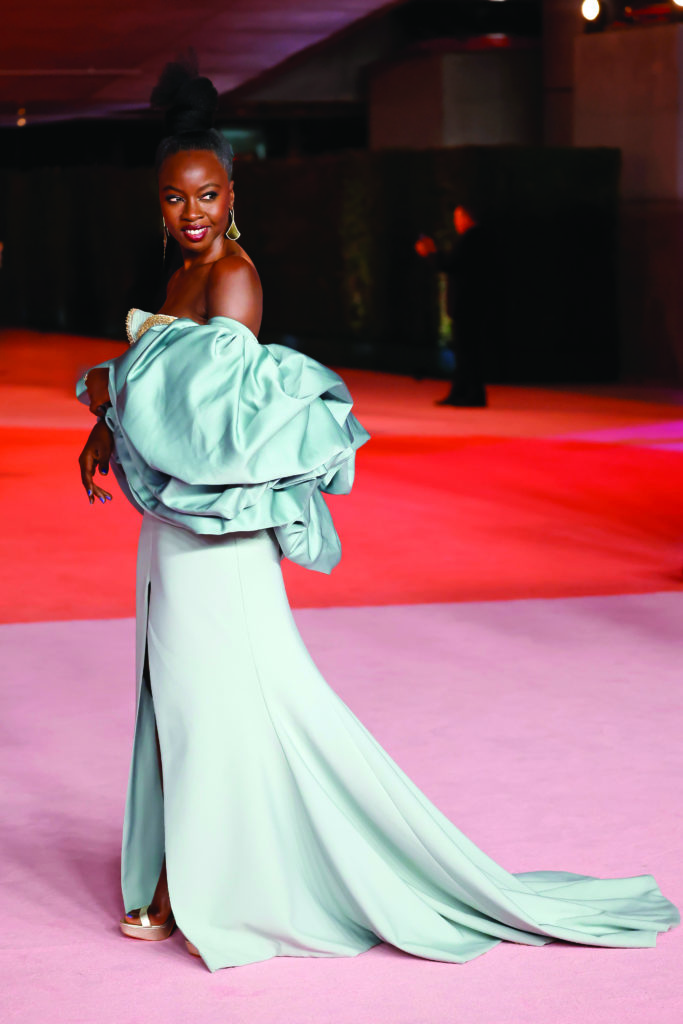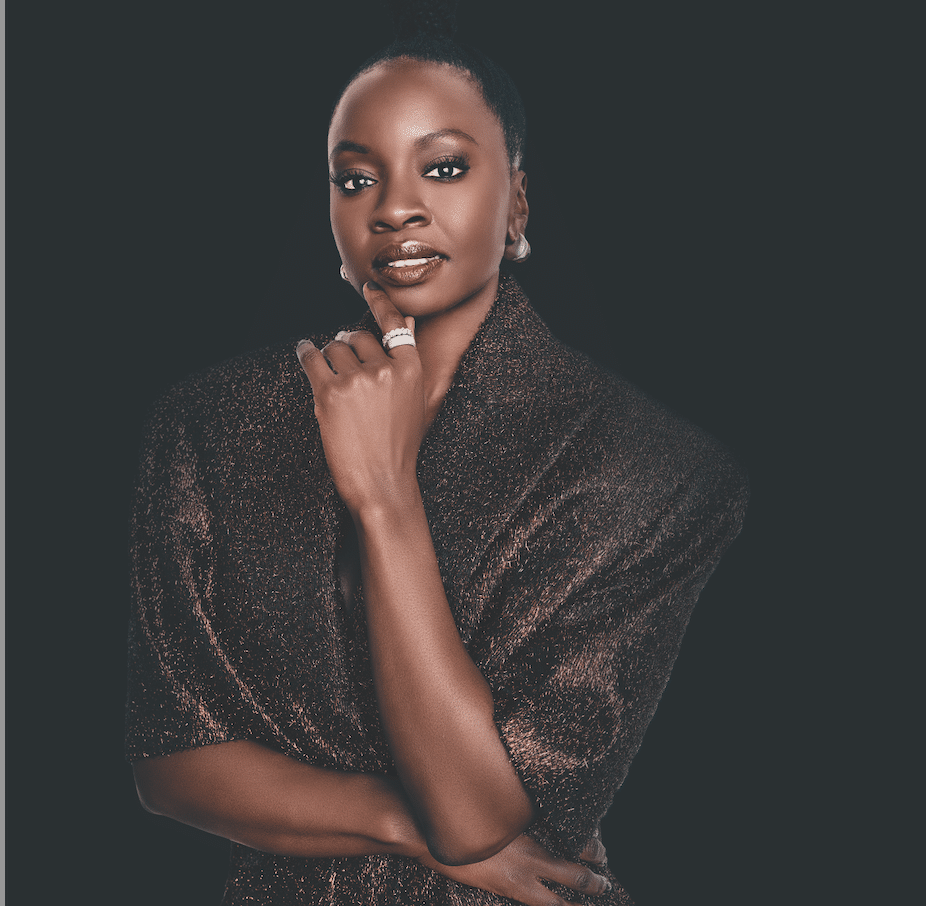When Danai Gurira returned to the United States (U.S.) at the age of 19 from Zimbabwe, she was acutely aware that something was lacking in the way African stories were being told.
“This built up an outrage in me, so to speak, because I couldn’t see the African narrative told, in the United States, in a way that I felt portrayed us, in a way that was truthful, complex, full and humane… I saw that being allowed for the Western perspective, but not for our perspective,” she says.
Fast forward to 2024… It’s well after lunch in bustling New York City in the U.S. as Gurira logs on to Zoom for the interview, to reflect on her “strange geographical timeline”.
Born in the U.S., Gurira and her family moved back to Zimbabwe when she was fi ve years old. She then returned to attend school at Macalester College in Saint Paul, Minnesota’s capital city.
“When there was a perspective given for the African story, it was very much stereotyped; very one- to two-dimensional, and [it] fi lled me with more outrage,” Gurira tells FORBES AFRICA.
Loading...
Her iconic role as General Okoye of the Dora Milaje in Marvel’s Academy Award-winning Black Panther, Black Panther: Wakanda Forever as well as her roles in Avengers: Infi nity War and Avengers: Endgame had a notable impact on the topic of representation of Africa in cinema.
Gurira recalls moments during the fi lming of the massive blockbuster, Black Panther, where everyone involved wanted to ensure they brought in “as much ‘African’ ” as possible to the entire production.
From language to consumption, everything was about “authentic representation”.

“The pressure was there inside of ourselves because, if you get a platform that big, you have to bring your authenticity to it. The irony is, some people would say – who I disagree with – ‘if you get a platform that big, make sure that it is palatable to everybody’. And I say, ‘if you get a platform that big, get as specifi c in your authenticity as possible because then people will have to celebrate the fact that this is a story we’ve never seen, and why aren’t we seeing more of them?’ ”
Crossing the cultural bridge continued into the second part of the Black Panther franchise, even as the cast and crew mourned the loss of cast member and “leader”, Chadwick Boseman, who passed away in 2020 after a four-year battle with colon cancer.
“We had the most horrible tragedy in losing Chadwick,” Gurira says. “There was pressure in that we wanted to make sure we were honoring him, and we were honoring the legacy that he had left in terms of how he so beautifully and brilliantly led us through the first one.
“But it was also about a lot of processing and grieving that we had to walk through together.”
Before her work with Marvel, earlier on in her career, Gurira had learned the power of saying ‘no’, something she encourages emerging African artists to do as well.
After finishing her graduate training, Gurira was approached to do playwright workshops in New York.
In a 2012 interview with Marin Theatre, Gurira said that playwriting became “a necessity, being the mother of invention type thing” as she wanted to see and perform stories that reflect her people.
The workshops in The Big Apple were an opportunity for her, as an actor, to help other playwrights. But again, she noted that the portrayal of Africans was being done in an “infantile way”.
“I remember I was just really furious, and I had a school-mate who was at a play workshop with me, and he said, ‘you have to start saying no’.”
However, for Gurira, this meant fighting for the portrayal of Africans and African-Americans to be accurate and genuine, no matter the medium. During her time as a play-wright, Eclipsed was reportedly the first Broadway play to have an all-female cast, writer and director. To further the perspectives of African women in mainstream theater, her stage plays – which also include In the Continuum and The Convert – give a voice to the untold narratives.
As a writer, Gurira’s focus and mandate is clear, even when she is adapting books – it needs to be about creating a vision and authentically telling a story that advocates for Africa.
Some individuals have openly identified the problematic theme surrounding stories about the continent in that they either perpetuate stereotypical and harmful narratives about Africa or come across as inaccurate.
In a 2023 academic article by Stellenbosch University’s Rebecca Pointer, she states that while some studies have suggested that the stereotypical Western mainstream media narratives about Africa may be shifting, there are still some platforms where these stereotypes continue to repeated.
“Behind these stereotypes is the assumption that Africans are poor, lack agency, and they frequently experience famine, such that only interventions from Western development agencies can help turn things around,” Pointer wrote in her study titled Beyond western Afro-pessimism: The African narrative in African and non-western countries. “While the [current] data are discouraging, there are pockets of hope on digital media (including social media), where women and youth are taking back the proverbial pen using storytelling and humour to show that Africa is neither monolithic, nor all doom and gloom,” Pointer adds.
“I created my first play (In The Continuum) because I was tired of the statistics around African women and HIV,” Gurira explains.
“It, sort of, was taking us away from being our fullest and just being individuals. We were statistics. And I was like, ‘let’s create a character that is telling a story where the audience can’t ignore her reality, her real human’.”
Gurira carried this passion into her work on film.
Notably, and recently, she has received a nomination by the Black Reel Awards for Outstanding Writing in a Drama Series, for the fourth episode of the limited series The Walking Dead: The Ones Who Live, which is a spin-off to the popular horror-drama series, The Walking Dead.
The series reunites her character Michonne with co-star Andrew Lincoln, who plays Rick Grime, to continue the journey and their love story in six episodes. Although Gurira’s final season was in 2020, she, Lincoln, and writer Scott M. Gimple had always hoped to return and continue Michonne’s story.
“So this was us finally fulfilling that promise to the fan-base,” Gurira says.
“Did I plan to be in this massive television franchise back in 2012 when I got that job? No, I had no idea that was coming to me. But it then became a thing where I’m part of something global and extremely popular. “[And then coming back] the power of that, as an African woman, is that I was now in a very, very powerful position in this very well-known franchise as a co-creator, executive producer, writer, and the star of the show. And that then allowed me a certain degree of power and connection to a process that I didn’t have 12 years ago when I got the job.”
While the world celebrates the strides that Africa has taken, especially from the lucrative creative economy, Gurira believes that Africans need to take ownership of their stories.
“I think I’m more concerned with us seeing us than what the West decides about us. If we are unapologetic in who we are and how we tell our stories, they’ll have to pay attention. But I think that, at the end of the day, we have to not make them our first concern. Our first concern is our pursuit of excellence and our pursuit of our narratives.” Off screen, as an ambassador for Irish singer-songwriter and activist Paul David Hewson’s Bono ONE campaign, as the co-founder of Almasi Arts Alliance, which supports African drama artists, and as the founder of Love Our Girls, Gurira is dedicated to furthering gender equality and policy change. “Don’t dilute yourself, even if people have to spend two hours reading subtitles – don’t dilute yourself. Tell it from a truthful, authentic place. And it might take a long time to find the right partners who see your vision, but they will come and you will be proud of what you’ve done,” concludes the artist who has done Africa proud.
Loading...
